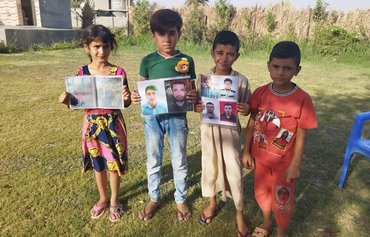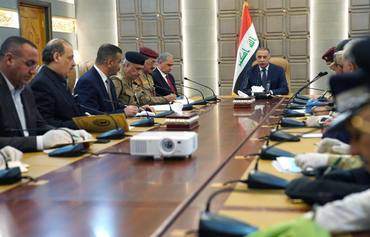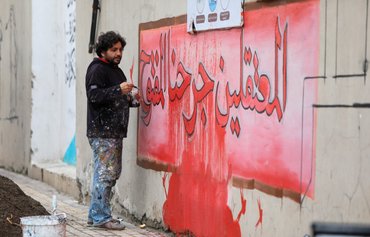In the aftermath of the "Islamic State of Iraq and Syria" (ISIS) group's defeat in al-Qaim, desperate residents are reporting that ISIS forcibly detained their sons and relatives in secret prisons and they still do not know their fate.
Iraqi forces on November 3rd captured al-Qaim, the biggest town under the group's control in Iraq.
Haditha tribal forces commander Sheikh Awad Saeed al-Jughaifi told Diyaruna he has recently met with a number of locals who lived under the group's control in al-Qaim.
One elderly woman told him that ISIS elements had taken her son from his home about a year ago and that she does not know whether or not he is still alive.
Another resident said that the fate of his brother has been unknown since his arrest by ISIS elements nine months ago.
"Most of the missing were former members of the security forces or government employees," al-Jughaifi said.
ISIS had accused them of collaborating with the Iraqi government by providing information about the group, he said.
Hundreds missing
Residents of al-Qaim confirm "the disappearance of more than 1,600 of their sons" since ISIS seized control of their city in mid 2014, he said.
The group usually held its detainees for a few days to interrogate them in al-Qaim, according to the residents.
"They would then be deported in batches of 50 to 150 men, and sometimes more, to detention centres or secret prisons in Syria after which news about them completely ceased," al-Jughaifi said.
ISIS does not have the resources to keep a large number of detainees alive in its prisons or headquarters, he said, noting that residents were not allowed near those sites to inquire about the fate of their relatives.
"Iraqi forces uncovered a hideout that was used to hold detainees in the neighbourhood of April 7 in al-Qaim, that contained handcuffs, chains and instruments of torture," he said.
The hideout also included documents and a list of seven people who were killed, he added.
No trace of those forcibly disappeared has been found so far in al-Qaim, or across the border in the Syrian towns that have recently been recaptured from ISIS.
Only one detainee was found during search operations in al-Qaim, al-Baghdadi district tribal mobilisation commander Sheikh Qatari al-Samarmad told Diyaruna.
The captive, 12-year-old Mohammed al-Mahalawi, was forcibly detained by ISIS 10 days prior to the Iraqi forces' storming of al-Qaim, he said.
Liberated Iraqis recount 'horrific details'
Local residents reported that ISIS held about 400 of their detained sons in a secret prison in Saada in al-Qaim on charges of collaborating with Iraqi forces and disloyalty to the group, al-Samarmad said.
Before the advance of Iraqi forces towards al-Qaim, ISIS transferred those detainees to the Syrian city of Albu Kamal, he added.
"The prison was empty after it was found," al-Samarmad said. "We do not know what happened to those who were there after their transfer."
ISIS has committed countless crimes, Anbar provincial council member Naeem al-Koud told Diyaruna.
"In every liberated city, residents have been recounting horrific details of grave abuses, mass executions, arrests and forcible disappearances, as well as campaigns of torture and repression," he said.
"We have lost many victims at the hands of terrorists, some of them have been found in mass graves, others have gone missing," he said.
ISIS has been defeated but the tragic consequences of its rule remain, he said.

![Local tribal fighters help maintain security in the recently liberated city of al-Qaim, whose residents report hundreds of their sons were forcibly detained by the 'Islamic State of Iraq and Syria' during its control. [Photo from the Haditha Tribal Brigades Facebook page]](/cnmi_di/images/2017/11/22/10384-Iraq-Qaim-tribesmen-600_384.jpg)






